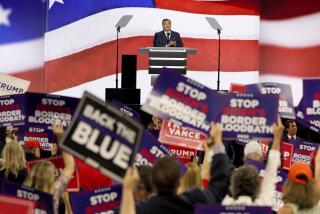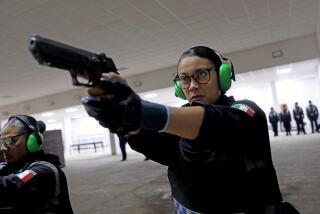Kosovo Battles Resurgence of Organized Crime
- Share via
PRISTINA, Yugoslavia — The brown Mercedes without license plates slowed on a downtown street, and the driver called out to a teenage girl.
“He pointed at me and said, ‘You, come closer,’ ” recalled the 13-year-old ethnic Albanian. “I didn’t go near but said, ‘What do you want?’ He said, ‘Don’t be a bad girl.’ I said, ‘What?’ Then he rolled up the window and left.”
The incident here in Kosovo’s capital lasted only a moment. But it was one that could strike fear into any parent’s heart.
“I’m afraid even for myself, not to speak of my daughter,” said Mevlyde, the girl’s mother, who asked that only her first name be published. Her greatest crime worry, Mevlyde said, is the kidnapping of children who are then sexually abused or sold into prostitution. “I think the ones involved in this are mostly Albanians from Albania,” she added.
The spillover into Kosovo of well-organized criminal gangs from neighboring Albania is a growing concern here for international authorities and ordinary people alike. Meanwhile, prominent local criminals have reemerged after largely disappearing from the scene during the North Atlantic Treaty Organization’s 78-day bombing campaign this spring and the initial deployment of international peacekeepers this summer.
Though peacekeepers have focused their efforts on reining in ethnic violence, more traditional forms of organized crime increasingly worry residents here. Many fear that Kosovo may resume its old role as a major transit point in the heroin-smuggling route from Afghanistan and Turkey to Western Europe and the United States. Car theft is rampant, and smugglers dominate much of the trade in cigarettes and gasoline.
Former leaders of the recently disbanded Kosovo Liberation Army say their unofficial “provisional government”--if only unleashed to take action--could crack down on much of this crime. But some foreign officials here say that people linked to the former guerrilla force--ranging from prominent figures to ordinary soldiers, plus toughs who are falsely claiming KLA connections--are part of the problem.
“This is a region that has a history of a lot of smuggling and organized crime,” said Larry Rossin, chief of the U.S. government office in Pristina. “It’s reasonable to see a resurgence and expansion of that. What’s important is to repress it to the extent possible at its early stages so it doesn’t result in a criminalization of Kosovo’s political culture and of Kosovo’s society, which I would not say is criminalized at this stage.”
Recognizing the need for tougher action, U.N. Secretary-General Kofi Annan last month urged the Security Council to authorize 4,718 U.N. police officers to serve in Kosovo, up from a current deployment of about 2,000 and an authorized level of 3,155. These officers are gradually assuming law enforcement duties from peacekeeping troops and in the months ahead will receive growing assistance from a local police force currently in training that eventually will number 3,500 officers.
The local officers are expected to play a critical role. Given the barriers of language and custom, some foreigners say that without the officers’ assistance, U.N. police will never be able to make a major dent in organized crime.
The U.N. police “don’t know the Kosovo scene,” a Western diplomat said. “The only people who are going to be able to catch and deal with organized crime here are Kosovars.”
Many well-connected people--foreigners as well as locals--are aware of the basic outlines of organized crime and even know who some of the suspects are. Doing anything decisive about it, however, is difficult, dangerous--and generally not yet a top priority.
“I know a lot of people’s names and a lot of what’s going on, but that doesn’t mean I can stop it,” said a foreign official who requested anonymity. “I’d be lying face down in a gutter faster than I want to think about it.”
In the five months since international peacekeepers entered Kosovo--which is under United Nations administration but technically remains a part of Serbia, Yugoslavia’s dominant republic--soldiers and U.N. police have struggled primarily to suppress crimes tinged with ethnic hate: revenge killings and kidnappings, and the looting or burning of homes.
Since early summer, there has been a dramatic drop in the rate of crimes in those four major categories, which international peacekeepers say represent the main threats to physical safety in Kosovo.
While spokespeople for the peacekeepers, known as Kosovo Force or KFOR, say further improvements are essential, they also cite official statistics showing that murders have dropped from an annualized rate of 164 per 100,000 people in late June to a rate of about 30 per 100,000 by the end of the summer, and a rate of 24 per 100,000 in the first three weeks of November. The most recent figure is about half the murder rate in Washington, D.C., last year.
From mid-June to the end of October, 360 people were reported murdered in Kosovo, 38% of them ethnic Albanians, 35% Serbs and 27% of other or unknown ethnicity. Serbs are estimated to number slightly less than 5% of the population.
Anger against Serbs runs high among Kosovo’s majority ethnic Albanians, about 1 million of whom were driven from their homes in spring by Yugoslav forces and returned only under the protection of peacekeepers.
“We are mostly soldiers, not policemen,” said KFOR spokesman Ole Irgens. “We will start to deal with the drug smuggling, with the organized crime, but those are tasks that require more skilled policemen.”
Another issue of growing concern is criminal acts linked to former KLA members, a politically sensitive subject here.
Michael Schulte Schrepping, head of U.N. police investigations in Pristina, said that, of 750 arrests made by soldiers and police in the area since peacekeeping forces entered Kosovo, only 16 detainees were carrying KLA membership cards.
“We can only verify these guys are UCK [the Albanian acronym for KLA] when they are carrying membership cards,” Schrepping added. “I’m sure a high percentage of the guys we have arrested are UCK. Most of these UCK are involved in weapons violations, house occupations, intimidation and threats.”
Another foreign official who requested anonymity said a fairly prominent former KLA figure “is linked to some of the worst--kidnapping, forced prostitution and other nasty stuff that he and others are alleged to be involved in. . . . He’s an extremely dangerous guy. You don’t want to go asking questions about him on the street. You’ll get yourself killed.”
Even some police officers fear assassination by former KLA members.
“What really worries me is they’re everywhere,” said a U.N. officer who requested anonymity. “They have their infiltrators. There’s somebody at the U.N. [mission in Pristina] working with them and giving them all the information on us. They know where we live. When they threaten you, you’ve got to take it seriously. Although no attacks have occurred on us yet, I think it’s just a matter of time.”
The U.N. administration’s first big step to address organized crime issues is the planned launch of a vehicle registration program.
Many cars in Kosovo do not have license plates. That is partly because Yugoslav forces took the plates off many cars when ethnic Albanian refugees fled in spring, and the U.N. mission has not yet issued replacement plates. But some unlicensed cars on the streets clearly are stolen.
The registration process will allow police to check vehicle engine numbers against Europe-wide lists of stolen cars. Many stolen vehicles are believed to have been brought to Kosovo by organized theft rings aided by lax enforcement here.
Rexhep Selimi, minister of public order in the provisional government formed mainly by ex-KLA leaders, said his personnel could better help fight crime if they were granted authority to act. Ethnic Albanians here say nonuniformed provisional government police conduct patrols and often head off trouble or break up fights. The officers are not empowered by the U.N. mission to do even this, much less to make arrests.
But key figures in the international effort in Kosovo are determined not to grant policing authority to Selimi’s self-appointed forces. Some view the provisional government’s unauthorized policing and revenue-raising efforts as bordering on organized crime, since under Security Council resolutions all such policing and administrative powers are granted to KFOR and the U.N. mission here.
According to ethnic Albanians, foreigners and reports in Kosovo’s Albanian-language media, the provisional government collects money by imposing taxes on gasoline and informal customs duties on trucks that have crossed into Kosovo and passed the U.N.-administered customs, and demanding flat monthly fees or percentages of profits from bar and restaurant owners.
Selimi denied any links between organized crime and the provisional government. He said that anyone with evidence of, for example, drug smuggling by former KLA members would do his government a favor by sharing that information.
“If anyone in Kosovo has information that KLA members were or are involved in drugs, we won’t hesitate to denounce them publicly,” Selimi said. “But we haven’t had that kind of case.”
Lt. Col. Rick Swengros, the commander of U.S. military police in Kosovo, said that it is clear some former KLA members are involved in criminal activities but that he has seen no proof that the former KLA as an organization or its former leaders are involved in crimes.
“There are a lot of allegations that the [former] KLA are doing stuff . . . [but] I haven’t arrested folks because I don’t have the evidence to support it,” Swengros said. “I have nothing at this point that says I have to arrest some KLA bigwig because of links to organized crime. Show me the evidence, and I’ll go arrest them.”
More to Read
Sign up for Essential California
The most important California stories and recommendations in your inbox every morning.
You may occasionally receive promotional content from the Los Angeles Times.













